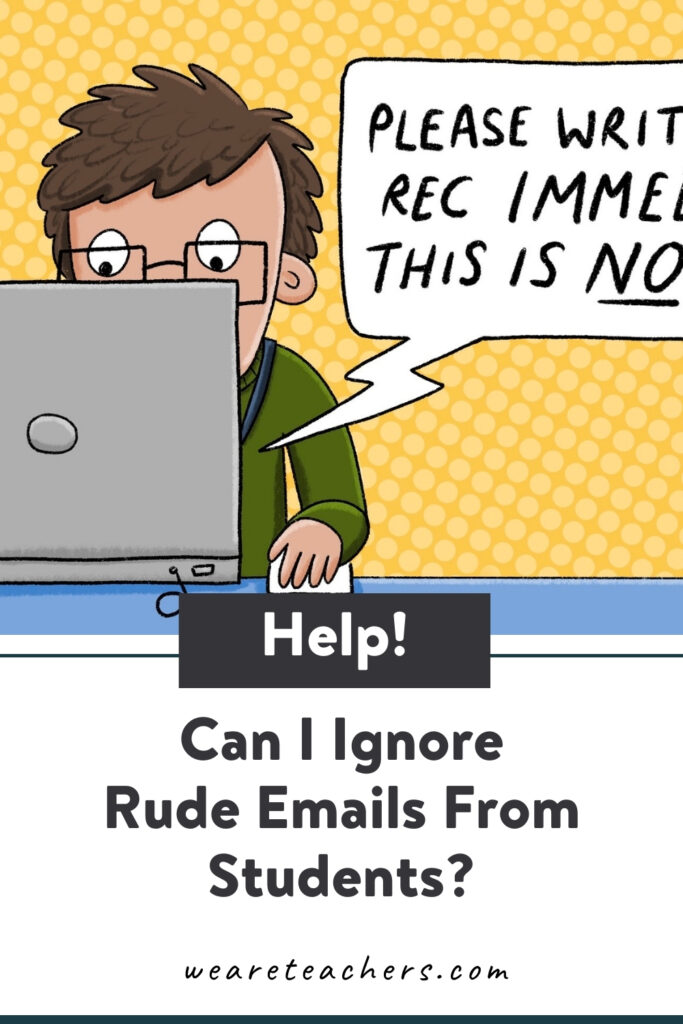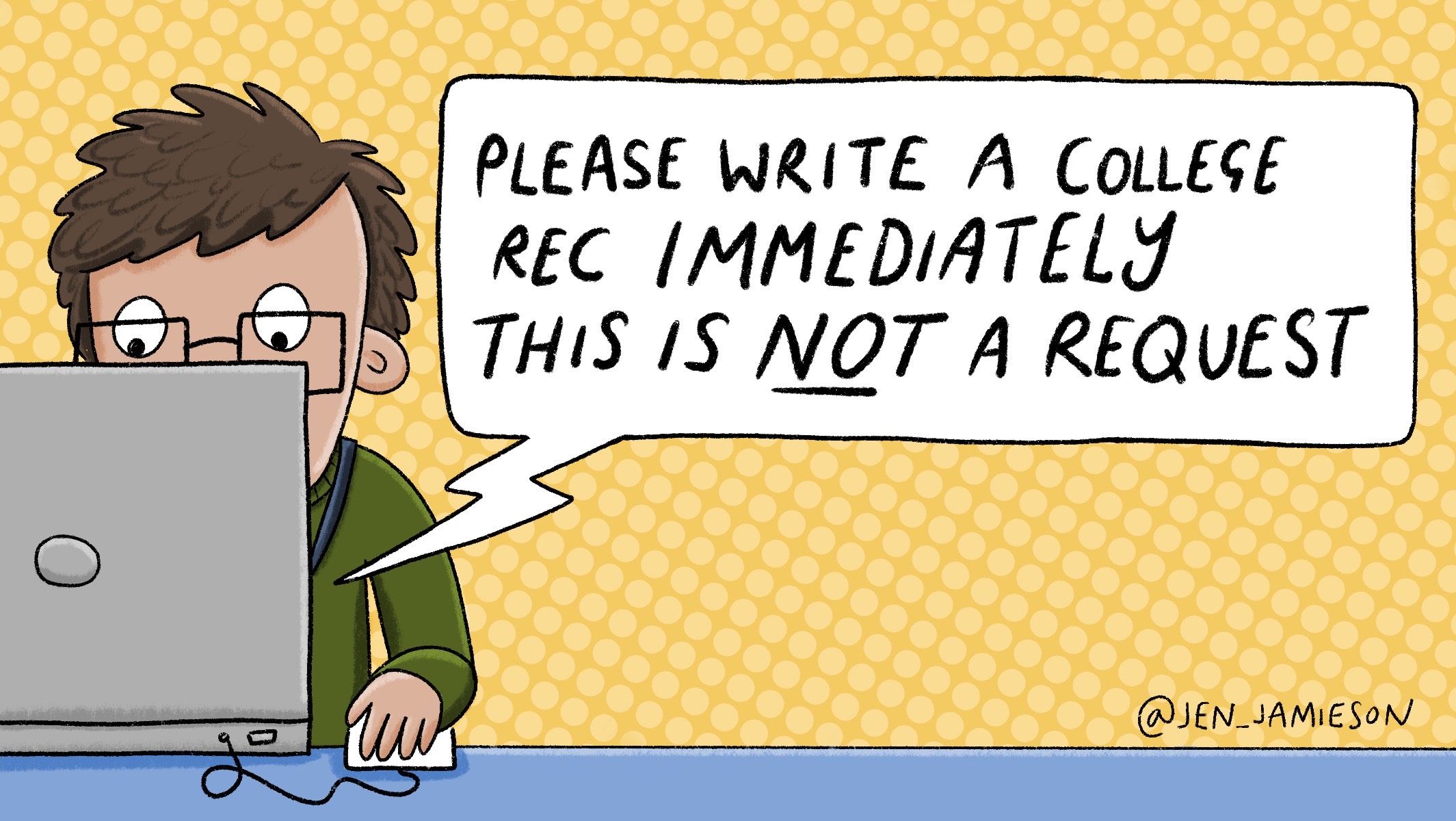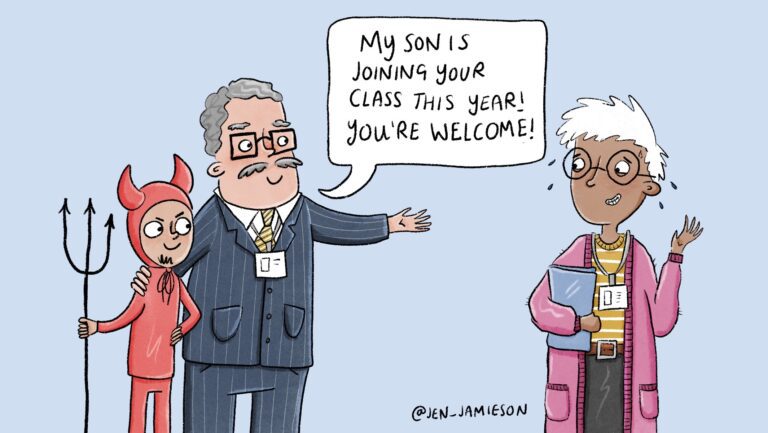Dear We Are Teachers,
I teach high school juniors. Last week, I got an email that said, verbatim and in its entirety: “Need a letter of rec from you no later than WEDNESDAY AT NOON.” This was sent on a Tuesday at 11:35 p.m. and I didn’t see it until I logged into my email at school. There was no way I could have written the letter before noon anyway, so I didn’t respond until after school. When the student’s dad complained about my late response, I reminded him that our student code of conduct says students have to give a full week’s notice when requesting a letter of recommendation from a teacher. Then the parent complained to my principal that my pettiness in ignoring his child cost him his college admissions! The entitlement is going to break my brain. Do I have to respond right away to rude emails from students? Or at all?
—RETURN TO SENDER
Dear R.T.S.,
I’m always amazed when people choose to be rude toward someone with the unique ability to make or break their situation. This student commands his teacher to write a letter at the last minute. What does he think that letter is going to contain, glowing tributes about his likeability and time-management skills?
I totally understand your feelings here. But with a time-sensitive, high-stakes issue like this, I do think a quick response/acknowledgement (as long as it’s during school hours) is best. Plus, the less you give parents to use against you, the better.
Responding promptly doesn’t mean you’re a doormat. You can still set healthy boundaries and help your student course-correct for the future. I would say something like:
“Thank you for your email, [name]. Unfortunately, I won’t be able to write you a letter in time. Per our code of conduct, teachers need at least a week’s notice to write a letter of recommendation. I just don’t have the space in my workday tomorrow.
“I hope you’re successful in finding another teacher to write one in time. I would recommend revising the tone in your next request. Understandably, you’re up against a tight deadline, but communicating consideration and appreciation of the expediency you’re asking of your teacher will go a long way.”
The other thing I’d do? Next year, start off with a weeklong unit called “The Dos and Don’ts of Emailing Your Teachers” so you can keep the rude emails from students at bay.
Dear We Are Teachers,
A coworker on my team (9th grade bio) has really awful breath. We get along great. He is a super-nice guy. But his breath literally smells like a dingy turtle tank. During our PLCs, I can smell it three chairs down. I’ve tried offering him mints and gum before we start and he turns them down! I don’t know what else to do, and I’m terrified of hurting his feelings. Is it OK to go to my AP about this?
—TURTLE BREATH GIVES ME SHELL SHOCK
DEAR T.B.G.M.S.S.,
Poor guy. He’s had to have overheard mean comments from 9th graders. They’re ruthless.
This could be several things. It could be that he’s not practicing oral hygiene (or not practicing it adequately). But it could also be a condition I learned about via the movie The Holdovers: trimethylaminuria, or “fish odor syndrome.” There are other medical conditions that can cause this, too.
If you’ve exhausted the options to alter your behavior (and I agree, it would be weird to sit away from everyone else during PLC), I think you need to talk to him. If it were me, I’d be way less embarrassed if a loving coworker approached me than my boss coming to me with anonymous complaints.
Here’s what you can say.
“David, I love working with you. I feel like we can be honest with each other. There’s something that has been distracting me during our PLCs and when I work closely with you. Your breath has a very strong odor. Is this something you’re aware of?”
Ending with a question gives him a jumping-off point instead of an awkward silence. Anticipate possible responses and emotions—embarrassment, defensiveness, shock—and remain compassionate. Hopefully, he’ll either offer to try to fix it or give you strategies that his loved ones use to mitigate it. And if he responds that there’s nothing he can do (e.g., a medical condition), say, “Thank you for telling me. I won’t bring it up again.”
Dear We Are Teachers,
I’ve had repeated issues all year with an 8th grader I’ll call Charlie. My AP refuses to issue any official consequences for Charlie—but also won’t let me issue consequences. Charlie vandalized a desk the first week in August with a Sharpie. My AP told me that making Charlie clean the desk was “inappropriate” because “discipline is [his] job.” When Charlie cheated on an assignment, I was told to ignore our student code of conduct—which says cheating results in a zero—and “give him some grace” (full credit). On our first day back this semester, Charlie took my Starbucks drink off my desk when my back was turned and downed it. Our AP issued no official consequences, and when I told him I was frustrated at this pattern, he told me, “You know, you make it too easy for other people to get a rise out of you.” I am livid. Should I complain to my principal?
—SORRY, Charlie
Dear S.C,
Whew! As we say around here, “Them’s fightin’ words.”
I can’t speak to whether or not your AP’s “consequences” were appropriate because I wasn’t there.
THAT SAID …
No matter what your AP thinks of you, it’s his job to support teachers with what they need to do their job effectively. Sometimes that’s discipline. Sometimes that’s helping connect teachers with PD they need to improve. And your AP has done neither. Plus, anyone with an ounce of emotional intelligence knows a statement like “you make it too easy for people to get a rise out of you” hurts more than it helps.
I’d do one more thing before going to your principal. Email this to your AP:
“I’m struggling with a student’s behavior. The strategies I’ve been using at the classroom level aren’t effective, and I’m worried that the behaviors will continue to escalate. Can we schedule a time for you to share your recommendations to support me in managing this student’s behavior?”
This language and the formality of an email should clue in your AP that you are documenting a request for him to do his job. And he should be grateful you didn’t cc your principal.
Take notes during the meeting. If he still refuses to give you any direction, support, or recommendations in curbing this child’s behavior, go to your principal.
Bring your meeting notes. (He made it too easy to get a rise out of him.)
Do you have a burning question? Email us at askweareteachers@weareteachers.com.
Dear We Are Teachers,
One of the foreign language teachers at our school loves to talk about how the keto diet has changed her life. She will often hijack conversations with other teachers to talk about how keto could improve our health and solve seemingly all of our problems. This week, one of my students told me that she asked to go to the nurse for a headache. This teacher let my student go, but not before telling her that she could get rid of her headaches by going keto! I’ve complained to an administrator about this before, and she said she gave her a warning, but clearly she still feels comfortable prescribing this diet. Should I tell my admin again? It feels like tattling.
—KEEP YOUR KETO TO YOURSELF-O


